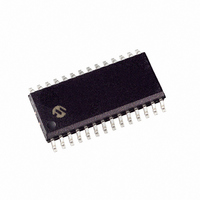PIC18F26K20-E/SO Microchip Technology, PIC18F26K20-E/SO Datasheet - Page 12

PIC18F26K20-E/SO
Manufacturer Part Number
PIC18F26K20-E/SO
Description
IC PIC MCU FLASH 16KX16 28-SOIC
Manufacturer
Microchip Technology
Series
PIC® XLP™ 18Fr
Datasheets
1.PIC18F25K20T-ISS.pdf
(42 pages)
2.PIC18F25K20T-ISS.pdf
(456 pages)
3.PIC18F26K20-ISS.pdf
(6 pages)
4.PIC18F26K20-ISS.pdf
(10 pages)
5.PIC18F26K20-ISO.pdf
(430 pages)
Specifications of PIC18F26K20-E/SO
Program Memory Type
FLASH
Program Memory Size
64KB (32K x 16)
Package / Case
28-SOIC (7.5mm Width)
Core Processor
PIC
Core Size
8-Bit
Speed
48MHz
Connectivity
I²C, SPI, UART/USART
Peripherals
Brown-out Detect/Reset, HLVD, POR, PWM, WDT
Number Of I /o
24
Eeprom Size
1K x 8
Ram Size
3.8K x 8
Voltage - Supply (vcc/vdd)
1.8 V ~ 3.6 V
Data Converters
A/D 11x10b
Oscillator Type
Internal
Operating Temperature
-40°C ~ 125°C
Processor Series
PIC18F
Core
PIC
Data Bus Width
8 bit
Data Ram Size
3936 B
Interface Type
CCP/ECCP/EUSART/I2C/MSSP/SPI
Maximum Clock Frequency
64 MHz
Number Of Programmable I/os
25
Number Of Timers
4
Maximum Operating Temperature
+ 125 C
Mounting Style
SMD/SMT
3rd Party Development Tools
52715-96, 52716-328, 52717-734, 52712-325, EWPIC18
Development Tools By Supplier
PG164130, DV164035, DV244005, DV164005, PG164120, DV164136
Minimum Operating Temperature
- 40 C
On-chip Adc
11-ch x 10-bit
Package
28SOIC W
Device Core
PIC
Family Name
PIC18
Maximum Speed
64 MHz
Operating Supply Voltage
2.5|3.3 V
Lead Free Status / RoHS Status
Lead free / RoHS Compliant
For Use With
AC164112 - VOLTAGE LIMITER MPLAB ICD2 VPPAC164303 - MODULE SKT FOR PM3 64TQFP
Lead Free Status / Rohs Status
Lead free / RoHS Compliant
Available stocks
Company
Part Number
Manufacturer
Quantity
Price
- PIC18F25K20T-ISS PDF datasheet
- PIC18F25K20T-ISS PDF datasheet #2
- PIC18F26K20-ISS PDF datasheet #3
- PIC18F26K20-ISS PDF datasheet #4
- PIC18F26K20-ISO PDF datasheet #5
- Current page: 12 of 456
- Download datasheet (4Mb)
PIC18F2XK20/4XK20
1.2
• Memory Endurance: The Flash cells for both
• Self-programmability: These devices can write
• Extended Instruction Set: The PIC18F2XK20/
• Enhanced CCP module: In PWM mode, this
• Enhanced Addressable USART: This serial
• 10-bit A/D Converter: This module incorporates
• Extended Watchdog Timer (WDT): This
DS41303G-page 12
program memory and data EEPROM are rated to
last for many thousands of erase/write cycles – up to
10K for program memory and 100K for EEPROM.
Data retention without refresh is conservatively
estimated to be greater than 40 years.
to their own program memory spaces under inter-
nal software control. By using a bootloader rou-
tine located in the protected Boot Block at the top
of program memory, it becomes possible to create
an application that can update itself in the field.
4XK20 family introduces an optional extension to
the PIC18 instruction set, which adds 8 new
instructions and an Indexed Addressing mode.
This extension, enabled as a device configuration
option, has been specifically designed to optimize
re-entrant application code originally developed in
high-level languages, such as C.
module provides 1, 2 or 4 modulated outputs for
controlling half-bridge and full-bridge drivers.
Other features include:
- Auto-Shutdown, for disabling PWM outputs
- Auto-Restart, to reactivate outputs once the
- Output steering to selectively enable one or
communication module is capable of standard
RS-232 operation and provides support for the LIN
bus protocol. Other enhancements include
automatic baud rate detection and a 16-bit Baud
Rate Generator for improved resolution. When the
microcontroller is using the internal oscillator
block, the USART provides stable operation for
applications that talk to the outside world without
using an external crystal (or its accompanying
power requirement).
programmable acquisition time, allowing for a
channel to be selected and a conversion to be
initiated without waiting for a sampling period and
thus, reduce code overhead.
enhanced version incorporates a 16-bit
postscaler, allowing an extended time-out range
that is stable across operating voltage and
temperature. See Section 26.0 “Electrical
Characteristics” for time-out periods.
on interrupt or other select conditions
condition has cleared
more of 4 outputs to provide the PWM signal.
Other Special Features
1.3
Devices in the PIC18F2XK20/4XK20 family are avail-
able in 28-pin and 40/44-pin packages. Block diagrams
for the two groups are shown in Figure 1-1 and
Figure 1-2.
The devices are differentiated from each other in five
ways:
1.
2.
3.
4.
All other features for devices in this family are identical.
These are summarized in Table 1-1.
The pinouts for all devices are listed in the pin summary
tables: Table 1 and Table 2, and I/O description tables:
Table 1-2 and Table 1-3.
Flash
PIC18F23K20/43K20 devices, 16 Kbytes for
PIC18F24K20/44K20 devices, 32 Kbytes for
PIC18F25K20/45K20
PIC18F26K20/46K20).
A/D channels (11 for 28-pin devices, 14 for
40/44-pin devices).
I/O ports (3 bidirectional ports on 28-pin devices,
5 bidirectional ports on 40/44-pin devices).
Parallel Slave Port (present only on 40/44-pin
devices).
Details on Individual Family
Members
program
2010 Microchip Technology Inc.
memory
AND
64 Kbytes
(8 Kbytes
for
for
Related parts for PIC18F26K20-E/SO
Image
Part Number
Description
Manufacturer
Datasheet
Request
R

Part Number:
Description:
Manufacturer:
Microchip Technology Inc.
Datasheet:

Part Number:
Description:
Manufacturer:
Microchip Technology Inc.
Datasheet:

Part Number:
Description:
Manufacturer:
Microchip Technology Inc.
Datasheet:

Part Number:
Description:
Manufacturer:
Microchip Technology Inc.
Datasheet:

Part Number:
Description:
Manufacturer:
Microchip Technology Inc.
Datasheet:

Part Number:
Description:
Manufacturer:
Microchip Technology Inc.
Datasheet:

Part Number:
Description:
Manufacturer:
Microchip Technology Inc.
Datasheet:

Part Number:
Description:
Manufacturer:
Microchip Technology Inc.
Datasheet:











